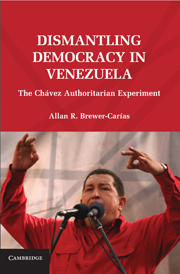Book contents
- Frontmatter
- Contents
- AUTHOR'S NOTE
- INTRODUCTION DEFRAUDING DEMOCRACY THROUGH NONCONSENSUAL CONSTITUENT ASSEMBLIES
- PART ONE THE POLITICAL ASSAULT ON STATE POWERS AND THE FRAMEWORK FOR AUTHORITARIANISM
- PART TWO INSTITUTIONAL DEVELOPMENT TOWARD CONSOLIDATING AUTHORITARIANISM
- PART THREE CONSTITUTIONAL REFORMS DESIGNED TO CONSOLIDATE AUTHORITARIANISM
- INDEX
PART THREE - CONSTITUTIONAL REFORMS DESIGNED TO CONSOLIDATE AUTHORITARIANISM
Published online by Cambridge University Press: 05 June 2012
- Frontmatter
- Contents
- AUTHOR'S NOTE
- INTRODUCTION DEFRAUDING DEMOCRACY THROUGH NONCONSENSUAL CONSTITUENT ASSEMBLIES
- PART ONE THE POLITICAL ASSAULT ON STATE POWERS AND THE FRAMEWORK FOR AUTHORITARIANISM
- PART TWO INSTITUTIONAL DEVELOPMENT TOWARD CONSOLIDATING AUTHORITARIANISM
- PART THREE CONSTITUTIONAL REFORMS DESIGNED TO CONSOLIDATE AUTHORITARIANISM
- INDEX
Summary
The 1999 Constitution, after being applied for one decade by an authoritarian government, during the years 2007 and 2009 was the object of two reform projects, one that has failed and the other that has succeeded – both marked by authoritarian trends. The president announced the first one in January 2007 and, at his initiative, submitted the proposed reforms to the National Assembly in August 2007. Once approved by the National Assembly as draft constitutional reforms, they were submitted to approval referendum in December 2007, where they were rejected by popular vote. The intent of this constitutional reform was to consolidate the authoritarian government that had taken shape in the country, by formalizing a constitutional framework for a socialist, centralist, military, and police state (Chapters 10, 11, and 12). Nonetheless, despite its popular rejection and contrary to the Constitution, many of the proposals have been unconstitutionally implemented through statutes and decree laws (Chapter 13) and through decisions adopted by the Constitutional Chamber of the Supreme Tribunal (Chapter 14). The president announced the second constitutional reform in 2008, after the first one had been rejected. That reform referred precisely to one of the rejected constitutional reform proposals, the one to substitute the constitutional limits on reelection of public officials –in particular, the president–with the possibility of continuous, unlimited reelection of public officials. This reform was conceived of as a constitutional amendment and elaborated as an initiative of the National Assembly. It was submitted to approval referendum in February 2009 and was approved by popular vote (Chapter 15).
- Type
- Chapter
- Information
- Dismantling Democracy in VenezuelaThe Chávez Authoritarian Experiment, pp. 263Publisher: Cambridge University PressPrint publication year: 2010



